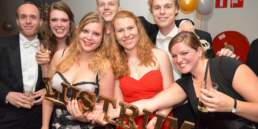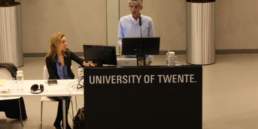AEGEE has many heroes. People who did incredible things and left their mark on the association. Many of them are celebrated today, although their actual achievements are exaggerated. But then there are also the unsung heroes. People with an enormous impact, but no one remembers theme. One of them is Kazimierz Romaniec, without whom many Polish antennae would not be the same. Kazimierz founded AEGEE-Kraków and helped setting up five other AEGEE contacts 25 years ago.
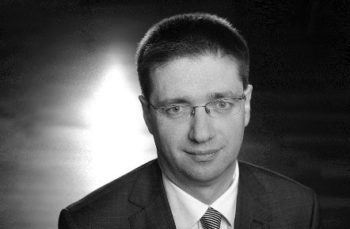
GT: Kazimierz, how and when did you join AEGEE?
Kazimierz Romaniec: In the end of 1989 or beginning of 1990 I was contacted by a friend, who studied at the London School of Economics, Justina Stewart. She told me that she was member of an association called AEGEE, which hadn’t spread in the east yet and told me that this would happen now. She asked me whether I would want to found AEGEE in Krakow.
GT: So you said yes?
Kazimierz: Actually, I did more than that. I collected a number of people from all over Poland, who started several AEGEE antennae. They were mostly friends of mine. We made a meeting in Kraków or Katowice and we agreed that we would introduce AEGEE to the people in these cities: Kraków, Katowice, Opole, Szczecin, Gdansk and Wroclaw. I still remember the names of all these people…
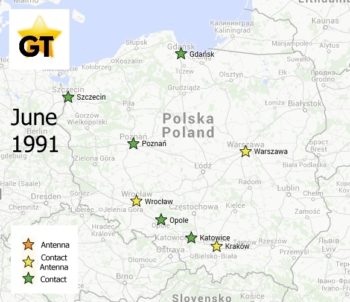 GT: Who were they?
GT: Who were they?
Kazimierz: In Kraków it was Maciej and Katarzyna Zawieracz, Artur Gala, Małgorzata Danikowska, Jarosław Kadyło, Piotr Banasik, Tomek Brudkowski, Przemek Łośko and me. In Katowice Paweł Walewski and Beata Winczakiewicz; in Opole Grzegorz Polak and Ziemowit Hermanowicz, in Szczczin Tomasz Wieczorek, in Gdansk Tomasz Szymczak; and in Wroclaw Leszek Kosiorowski and Tomasz Hodij. There was no AEGEE in Warszawa or Poznań yet, because I did not know anyone from these cities. We met them later. Most of these people went to the Presidents’ Meeting in Munich in spring 1990. In Munich we met among others Georg and Michael, who became CD members later that year – and me met Ludger Dauwe from Koblenz. He was a older than the others and became very important for us; he helped us a lot. He gave us a certain credibility and strengthened our cooperation within AEGEE.
GT: So how did AEGEE-Kraków came into life?
Kazimierz: In the beginning we had 15 memebers. This number had a high significance. We registered AEGEE in the court, and according to the law for associations the required minimum was 15 members. We did that around April or May 1991. We signed the Convention d’Adhésion in the spring Agora 1991 in Amsterdam. I don’t remember who else signed it from Poland…
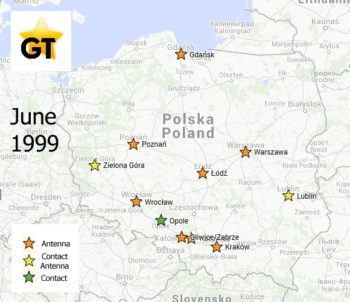 GT: According to the AEGEE Address Book of summer 1991 it must have been also AEGEE-Wroclaw and AEGEE-Warszawa. You were Vice-President of the antenna. Since you started it, why didn’t you want to become President?
GT: According to the AEGEE Address Book of summer 1991 it must have been also AEGEE-Wroclaw and AEGEE-Warszawa. You were Vice-President of the antenna. Since you started it, why didn’t you want to become President?
Kazimierz: Maciek had a good contact with the rector and we were friends, so it was not important who was President. In practice we did everything together, went to every meeting together.
GT: How was the communication within the antennae and with the network in the pre-Internet times?
Kazimierz: Internally we had our meetings, so communication was no problem. Externally we used the phone and paid from our own pocket. We also sent letters. Wonderful times!
GT: Tell more about the early times in AEGEE-Kraków. Did you easily get members?
Kazimierz: It might sound strange, but in the reality of Poland of that time our ultimate goal was not to find as many members as possible. We first wanted to register the antenna and then get members. We wanted to become independent from politics or political influences. We were a bit afraid after the communist experience that people might join because they wanted to only get something from the association instead of contributing also. We wanted to preserve our independence, we did not want to be dependent on anyone.
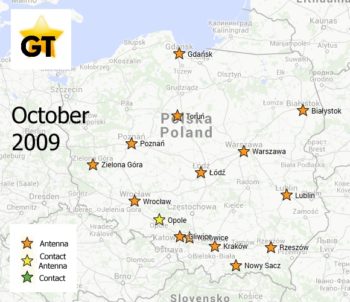 GT: I understand. In the 90ies there were unfriendly takeovers of antennae by students and their friends who wanted to abuse the possibilities of AEGEE. Some antennae were shut down.
GT: I understand. In the 90ies there were unfriendly takeovers of antennae by students and their friends who wanted to abuse the possibilities of AEGEE. Some antennae were shut down.
Kazimierz: Of course we wanted to have members and could have got a high number easily, but we wanted to see how serious they were about AEGEE, therefore we did not simply advertise AEGEE, but got them in slowly. Some members brought friends, who brought new friends and so on. We got 50 members after two years.
GT: In Spring 1992, AEGEE-Kraków was the first antenna in Central and Eastern Europe to organize a Presidents’ Meeting, the predecessor to today’s EPM. How many members did you have back then?
Kazimierz: When we did the PM, we had around 30 members. That’s not many people from the current perspective, but we were working hard. Moreover, all arrangements were quite modest. We had support from the university and the rector, but organised everything ourselves: accommodation, aula and workshop rooms, everything. It was great fun. Michael Merker and Oliver Drewes from the CD were very happy with everything.
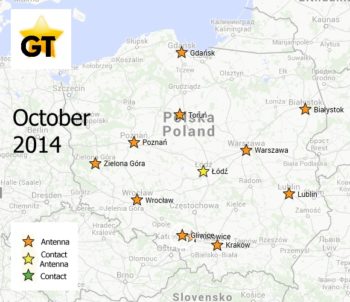 GT: The PM was just a few months after Agora Budapest, which was the first statutory event in the former East. How come that you applied for organising the Presidents’ Meeting?
GT: The PM was just a few months after Agora Budapest, which was the first statutory event in the former East. How come that you applied for organising the Presidents’ Meeting?
Kazimierz: It was the time when the CD wanted to have important events in Central and Eastern Europe, so that more people would see our part of Europe. We were active and persuaded them to give us the PM. We were the first local to sign the Convention d’Adhesion and were promoting ourselves in 1991. We wanted to show the people from outside from Poland that big changes took place. And that they could enjoy life in Kraków. For us it was also important to prove ourselves that we could organise an event to western standards.
GT: Was thePM the first event of your antenna?
Kazimierz: Yes, it was our first event! We hadn’t organised anything before. No one in our antenna said anything that we should make a smaller event first. We wanted to make big things. Moreover, we were fourth-year students, so we had to do it as quickly as possible, before graduating.
GT: How many participants did the PM have? And how did you lodge them?
Kazimierz: Between 100 and 150 people. We lodged them partly in students homes, partly in hostels. Sleeping during the PM was for free. Only the most notable people from the AEGEE top were in the hostels. When we were going for AEGEE meetings we got the accommodation for free, so it was natural that nobody paid. We had some sponsors that covered the costs.
GT: Which problems or great moments did you encounter during the PM organisation?
Kazimierz: I don’t remember big problems. Of course there were always small things, but we had helpers and big support. I mainly remember three wonderful evenings with long parties till 4 a.m.
GT: What kind of parties did you have, did you make sightseeing or a post-event?
Kazimierz: Kraków offers a lot of cellar pubs with good music. The parties were easy going. Good beer, good food, good music, good places. We did not have formal sightseeing, but when people wanted to see the city we told them what they could see where.
GT: How was finding sponsors for the PM?
Kazimierz: The university gave us the auditorium for free. They also gave us a small amount of money. We had some other sponsors, but only sponsoring in kind, like discounts in restaurants.
GT: What was the feedback of the PM participants? Probably many hadn’t been to Poland before…
Kazimierz: It was excellent. They were just shocked in a positive way! The friendliness of our members was rated very high. The lodging was not perfect, but the distances between university and the main dormitory was not far, three trams tops. Not everything went perfect, but the participants understood us.
GT: Where did the PM took place exactly?
Kazimierz: The PM took place in the Collegium Novum at the Jagiellonian University.
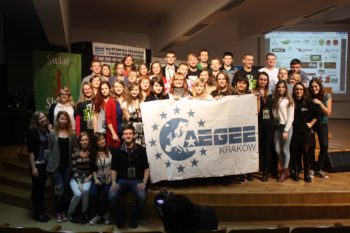
GT: Which effect did the PM have on your antenna?
Kazimierz: It was really an important event. Suddenly everyone wanted to become member. The people were motivated, and we felt that we could start looking for our successors. We still went to SUs, organised an SU, but our activities increased. 18 months later we left.
GT: When exactly did you leave AEGEE-Kraków?
Kazimierz: In 1993, after the end of my studies.
GT: Where and what do you work now?
Kazimierz: I currently work in Warsaw in one of the major law firms in Poland, dealing mainly with tax, sport and corporate law.
GT: Do you keep in touch with your AEGEE generation?
Kazimierz: I have contacts with my friends from my time and was in contact with AEGEE-Kraków five years ago. It would be nice to meet the current generation!

